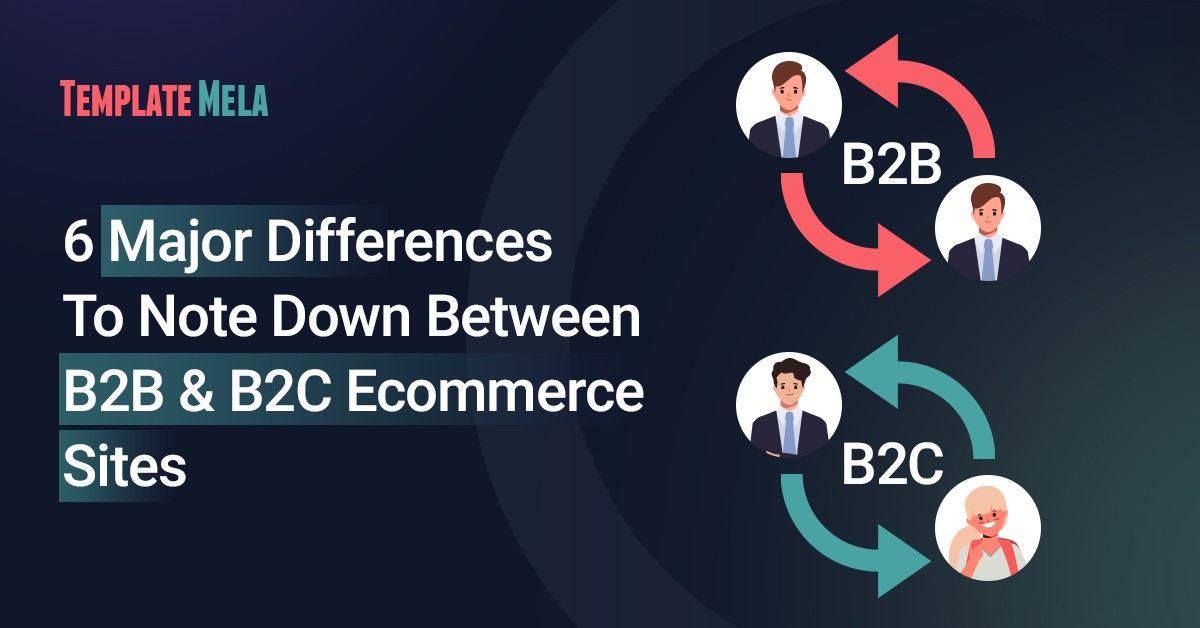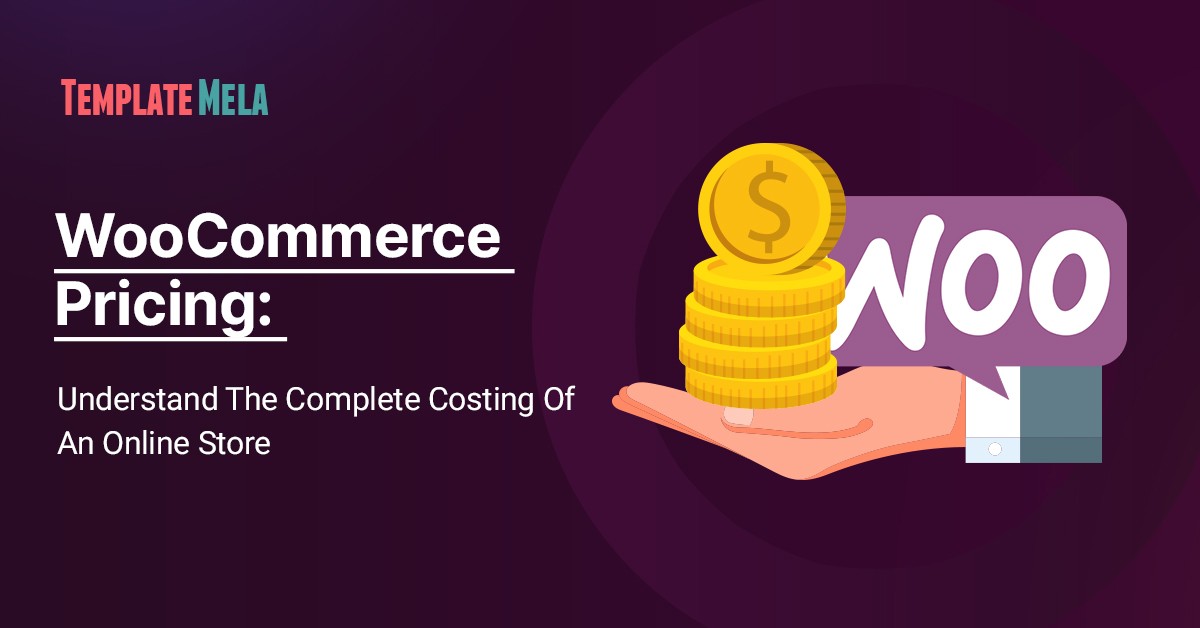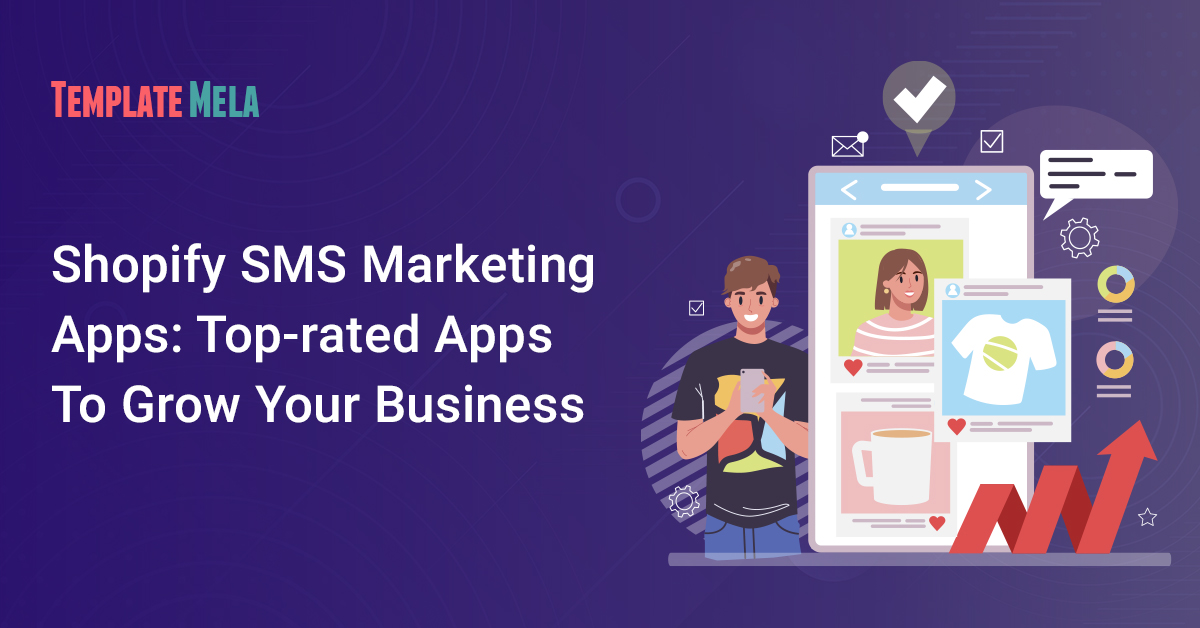Consider These 7 Best Shopify Alternatives This Year
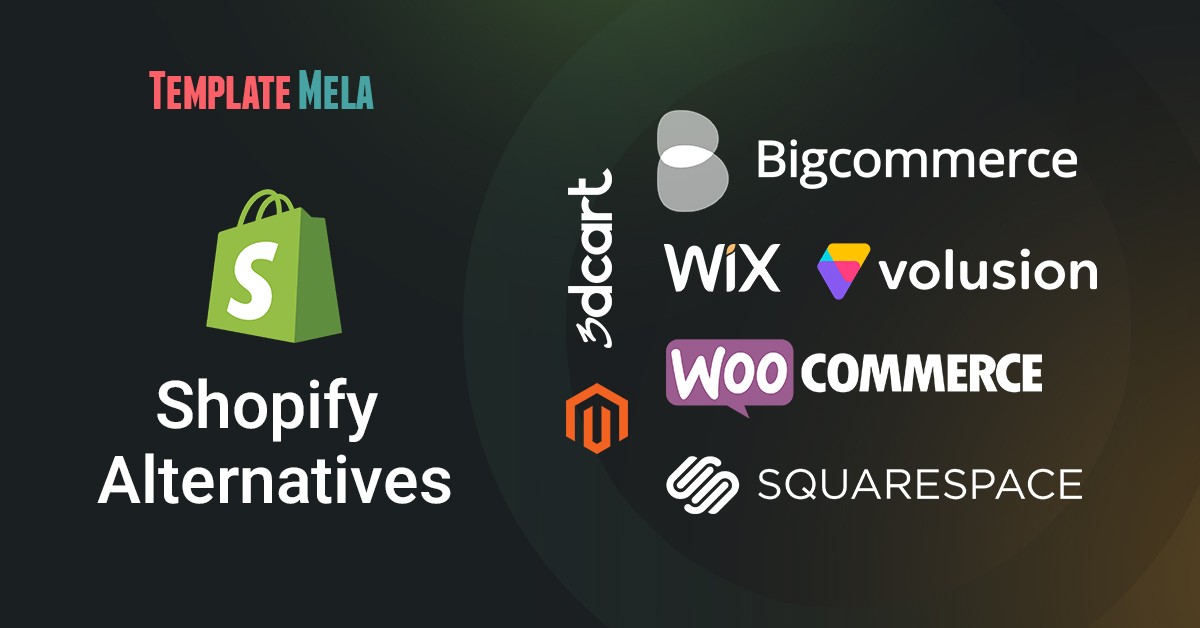
We know that you’re frustrated with Shopify and looking for some good Shopify alternatives which fulfill your requirements that are absent in Shopify.
Yet, it becomes a renowned name in the eCommerce industry, but it lacks many other platforms’ functionalities.
There are a lot of Shopify competitors which means a ton of similar websites like Shopify.
BUT you don’t have to go after each of them to check out what unique they are offering that suits you.
We have far reduced your work by searching for the best Shopify Alternatives.
In this guide, we have compiled the seven Shopify alternatives that we think could be the best option for your store.
Go through this guide and see which platform can satisfy your desired requirements.
Nevertheless, before we jump on the list of Shopify alternatives, let’s perceive some of the questions you might want to take a look at.
What Is Awful About Shopify?
Many have been annoyed with Shopify due to various reasons.
One of the most awful things about Shopify is that it won’t let you use your preferred gateway.
That means you have to use their exclusive payment gateway, which is Shopify payments.
However, if you still want to use your desired payment gateway then you will be charged up to a 2% transaction fee for each sale on your site.
Despite charging a 2% fee from you, it won’t allow you to transact in multiple currencies.
Isn’t it constrained people to do what they want?
What’s more?
Shopify does not want you to edit a file called robots.txt where you can tell Google not to index private or confidential pages in SERPs.
This could be by far the worst experience for the Store owner.
Robots.txt is very essential for eCommerce because there are many things you need to hide from the public.
This could be your sitemap details, login page, admin page, and more.
There might be more frustrating stuff about Shopify, but there are other options readily available to you.
Which won’t prevent you from doing anything.
Why Shopify Isn’t The Ideal Choice When Starting an eCommerce Store?
The experience becomes a major headache when you don’t get what you are paying for.
Let’s check out some of the reasons that prove other platforms offer better than Shopify.
1. Ridiculously Overpriced Themes:
We’re not saying that Shopify doesn’t have great-looking themes.
Yet, it does have.
But what we are against is the prices of the premium themes are too high.
There are only 9 free themes and around 64 premium themes in the official Shopify themes store.
It should have been more because you are using the same theme that many other sites have been using.
This significantly affects brand recognition.
Moreover, the prices of premium themes in the Shopify store starts from $140 to $200.
This is too costly if we compared it to other options out there.
You can checkout TemplateMela for the best Shopify themes at very affordable rates.
Shopify even offers a few free themes, but don’t expect a lot of customization and features.
2. Native Search Filtering:
You’ll miss the native filtering and search options when you set up your catalog.
Moreover, you can’t do a search that is restricted to a given product group, and misspelling is not auto-corrected.
The platform also has minimal requirements of product attributes, making it difficult to set up various fields for different product types.
There are third parties apps that can solve some of these problems, but they are not integrated into the platform of Shopify.
3. Limited Customization:
When you can’t customize as per your liking even after you pay too high then what’s the point of staying on that platform?
You need to hire a developer or have to learn code in order to customize anything.
Shopify won’t give you complete control of your store which means forget about using custom fonts, customize product pages and more.
Whenever you wish to change anything, you will have two options either to hire a designer or learn code.
It’s a very annoying thing for store owners to learn code just to edit some customization.
4. Vendor Lock-in:
Another reason not to choose Shopify is that it is a hosted platform.
There are some issues with a hosted platform such as suppose if Shopify goes bankrupt, then you will only have the option of losing your store.
Now you may say, I would take my store back up and migrate to another.
It’s not as easy as you think it is. You might have to create your store from scratch.
These were the few reasons, but it could be more.
But for now, let’s just jump on to find out what seven Shopify alternatives are.
Here Are The 7 Best Shopify Alternatives On The Market
You’ll get here various types of alternatives from hosted to open-source website builders, all of them are carefully chosen.
All the platforms have their unique functionalities & capabilities.
Choose the one which you find useful & which can take your store to the next level.
1. WiX
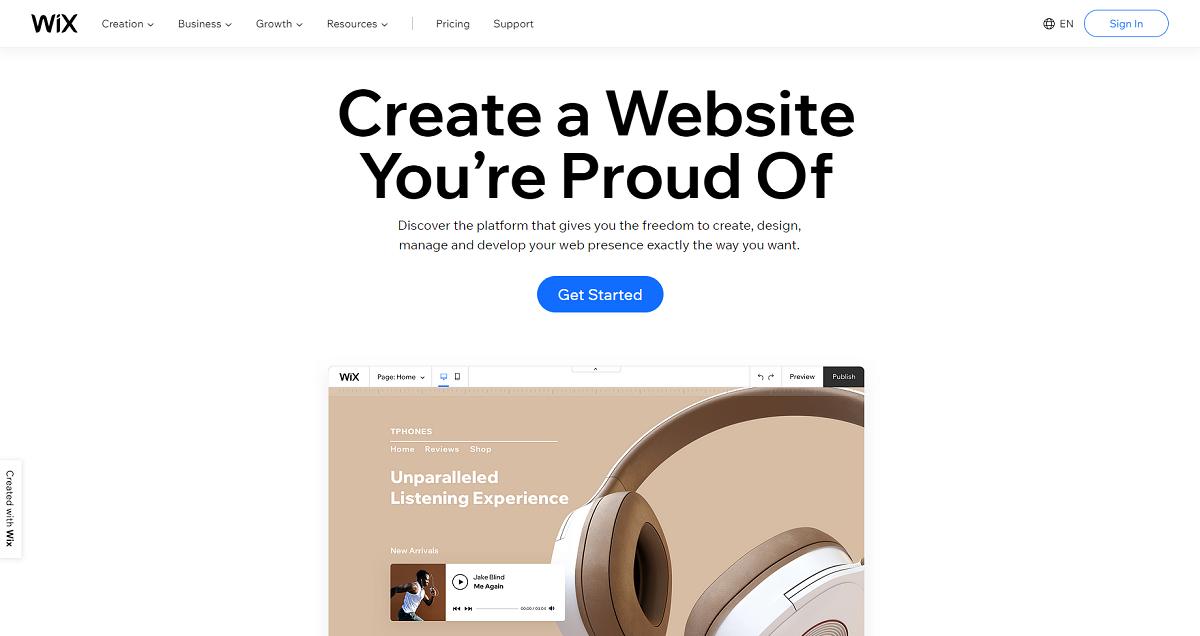
Who else doesn’t know about this?
Building your store with WiX is pretty much hassle-free.
It has easy to use interface & very much affordable plans.
Moreover, WiX is a hosted platform which means you don’t have to take care of anything such as hosting, SSL, back-end management, etc.
It’s a drag & drop builder, so you can create your own unique style with its elements and themes.
Themes Selection:
Speaking of themes, WiX got more than hundreds of templates, and what’s interesting is all of them are 100% free.
You can’t imagine there are 150million+ WiX stores out there, and the numbers keep growing.
Build Time:
There are two ways to build a store on WiX.
One is that you can choose everything by yourself, giving you complete user control and customization. You can adjust the way you want.
On the flip side, the second method in which WiX offers its ADI support.
What ADI does is that it asks you some of the questions related to your store and will create on its own. It’s a kind of assistant thing.
Plugins & Add-ons:
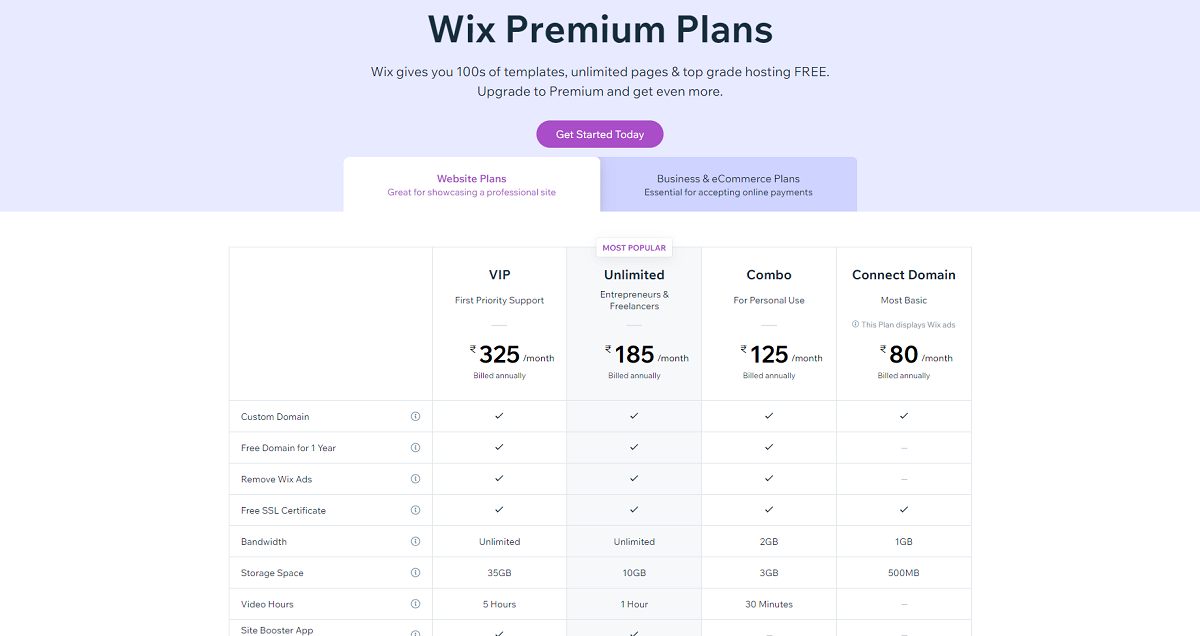
WiX has a plethora of apps, plugins, and add-ons.
Yet, there are a lot of options when it comes to designing a store such as change button style, adding a lightbox, live chat, coupons, and much more.
You name it.
Pricing:
WiX comes with fairly cheaper plans.
Although it has a total of two categories in pricing plans, one is for websites, and the other is for eCommerce plans.
Its eCommerce plans start from $23/month to $49/month, which is much cheaper than what Shopify offers.
Pros:
- Way too many customization options.
- Drag & drop interface.
- Loads of unique free themes & plugins.
- Its premium plans come with a 1-year free domain.
Cons:
- WiX is limited with its payment option, it doesn’t offer Apple or Amazon pay.
- Limited options for SEO.
- Maximum 50 GB.
2. WooCommerce
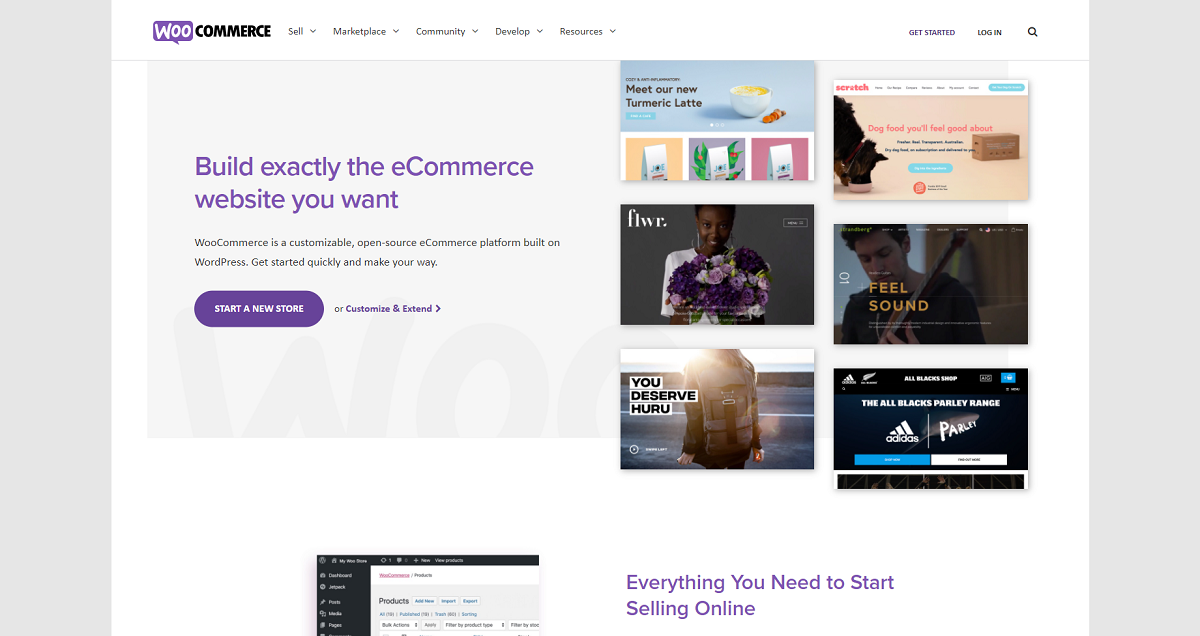
Another well-known name in the eCommerce industry is WooCommerce which is definitely far better than Shopify.
It is an open-source WordPress plugin that currently powers more than 5 million stores around the world.
Theme Selection:
When it comes to the theme selection, then WooCommerce offers a total of 20 themes including free & premium.
Yet, you’ll find tons of high-quality & stunning themes at affordable costs on third-party platforms.
One of the good examples of popular platforms is “Templatemela”.
All of its themes offer an exceptional level of customization.
These themes come with all the quality features such as SEO Optimized, responsiveness, unique fonts, and much more.
Build Time:
Many people think that setting a store on WooCommerce is a tough process.
But actually, it isn’t.
There are a few steps, buy a domain name, hosting, install WordPress, Install WooCommerce, choose a theme, and you’re good to go.
Yet, there are many other settings, too. You could refer to its guides & tutorial if you are stuck somewhere.
There’s nothing much complicated.
However, you can create your desired store in just 6 steps.
HOW?
We created a complete guide on creating an awesome WooCommerce store that you must need to check.
Plugins:
There are endless numbers of plugins in the WordPress plugin store.
You will get many plugins for WooCommerce for almost free. There are only a few plugins where you need to buy them.
There are some essential plugins you’ll get in WordPress such as checkout field editor, advanced shipment tracking, ajax search, and more.
Plugins are very beneficial in the growth of your store.
Pricing:
There’s no more cost except domain, hosting, and if you purchase a theme or plugin.
However, WooCommerce is a free download plugin.
It also won’t charge you anything additional such as transaction or payment processing fees.
If you choose WooCommerce, then it’ll be your best Shopify Alternative.
Pros:
- The foremost is that it is a free plugin, and many of its useful plugins come at no cost.
- Gives a free hand of customization.
- Easy to set up and use.
- Best for SEO.
- Access to tons of eye-catchy themes.
Cons:
- Yet, the plugin comes free but adds little costs such as the domain, hosting, and some other features.
- You will require a developer/designer for some changes related to HTML or CSS.
Adding too many plugins & functionalities can slow down your site’s performance.
However, we have created a comprehensive guide on WooCommerce vs Shopify that will assist you in making your decision.
3. BigCommerce

BigCommerce is number three on this list of Shopify competitors.
It is similar to Shopify but certainly better than Shopify. It’s also the best platform for your store to grow and scale.
It also offers the drag and drops feature to customize and build your store the way you desire.
Theme Selection:
BigCommerce includes some stunningly designed themes, its free themes are only 12, and premium themes are over 100.
In fact, each of its themes is made for different resolutions. None of its themes looks old-fashioned.
Build Time:
With BigCommerce, you can start selling your products in no time.
Why?
Because BigCommerce offers only three steps to develop your store.
All you have to add is your email address, store name, and a couple of questions regarding your store.
BigCommece is popular for its easy and quick onboarding process.
Plugins:
BigCommerce has a vast collection of eCommerce apps and is definitely more comprehensive than Shopify’s.
There are over 850 apps for you to use in the BigCommerce marketplace.
Each of its apps is essential in the BigCommerce store, which has a significant impact on the expansion and growth of your store.
Pricing:
BigCommerce is slightly on the costlier side but not as pricey as Shopify because what it offers at that price is acceptable.
Its starting plans come with the free subdomain, it also facilitates purchasing your preferred domain name straight from BigCommerce.
What’s interesting is that every plan provides unlimited bandwidth, products, staff count, storage, and more.
Moreover, you don’t have to pay any translation fees, which certainly gives Shopify an edge over Shopify.
This could also be a great alternative to Shopify.
Pros:
- The stores on BigCommerce do rank well due to strong SEO performance.
- Supports more than half of payment gateways without any transaction costs.
- You have full control of your store, anyone can build their store without any coding skills.
- Its every plan has the best in class features and 24/7 support.
Cons:
- There are very limited options for free themes.
- Also, there’s a slight curve of learning due to many features.
To make a more informed selection, see our BigCommerce vs WooCommerce comparison guide.
4. 3dcart
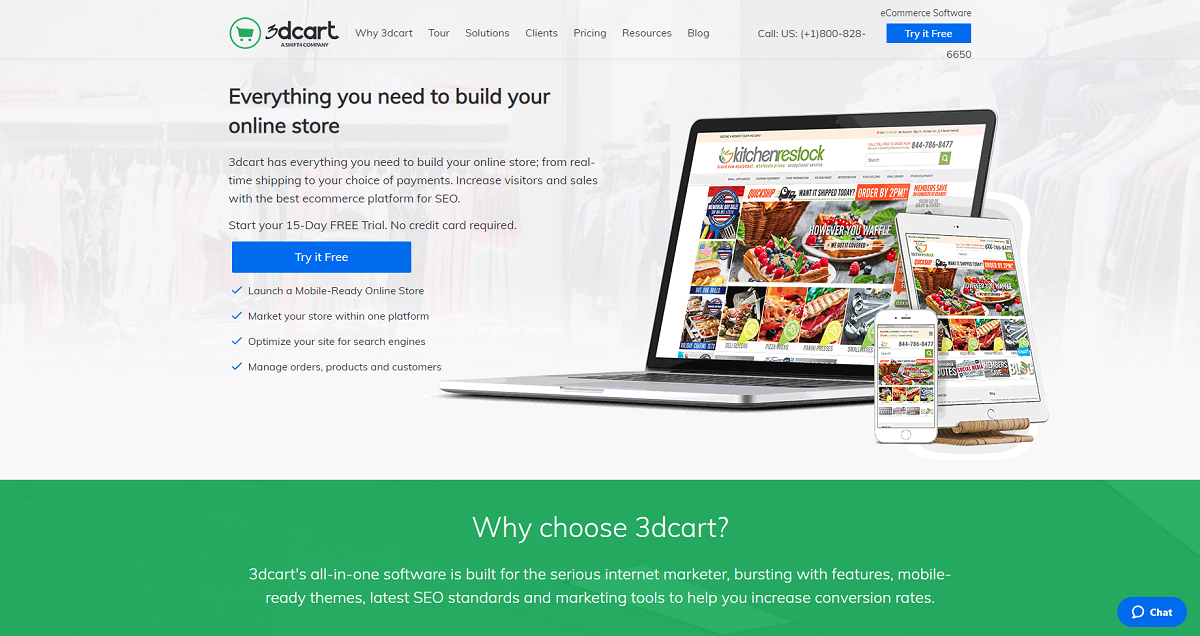
This is also a great Shopify alternative that you should look at.
3dcart is renowned for its crazy features and flexible rates.
Not only that but also, 3dcart is a highly scalable platform for growing businesses due to its limitless product storage capacity.
And if we talk about its security then it offers the utmost level of security no matter whatever plan you choose.
Theme Selection:
The platform has got several themes that are highly attractive & fully feature-rich.
Although 3dcart offers both free & paid themes.
There is no doubt that all these themes are professional-looking and modern.
Features:
The platform is never behind on offering features, it has more than 200 inbuilt features.
Using its incredible features, you can build up your store that really can stand out from others.
You will get the same features in every 3dcart plan.
Some of its best features include coupons, one-page checkout, reports and dashboards, product and customer reviews, and more.
Pricing:
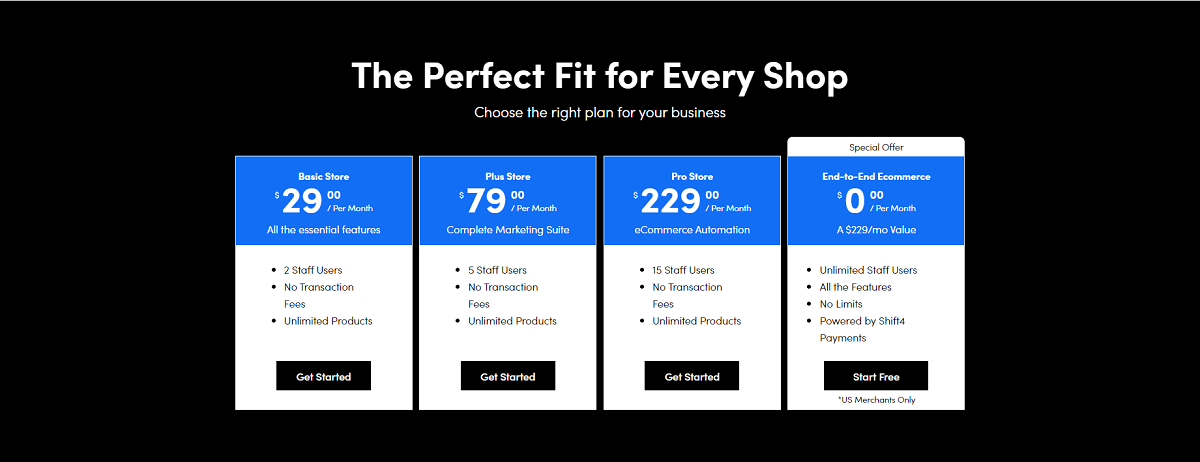
Compared to Shopify, 3dcart has a lot to offer at cheaper rates.
Shopify’s basic plan starts at $29 a month, while 3dcart’s basic plan starts at $19 a month, which is $10 less than Shopify’s.
What’s more?
Not only is there a difference of a few dollars, but 3dcart offers more than Shopify.
Its basic plan includes nifty features such as gift wrapping, social wish lists, unlimited product variants, upselling and cross-selling.
Pros:
- No limits on listing products.
- Significantly cheaper than Shopify’s plans.
- Offers an adequate amount of payment gateways (more than 100).
- Zero Transaction Fee.
- Loads of features & extensions than Shopify.
Cons:
- Editing themes with HTML/CSS editing.
- Lack of some features and plugins that are required for eCommerce.
- Negative reviews of help & support.
5. Volusion
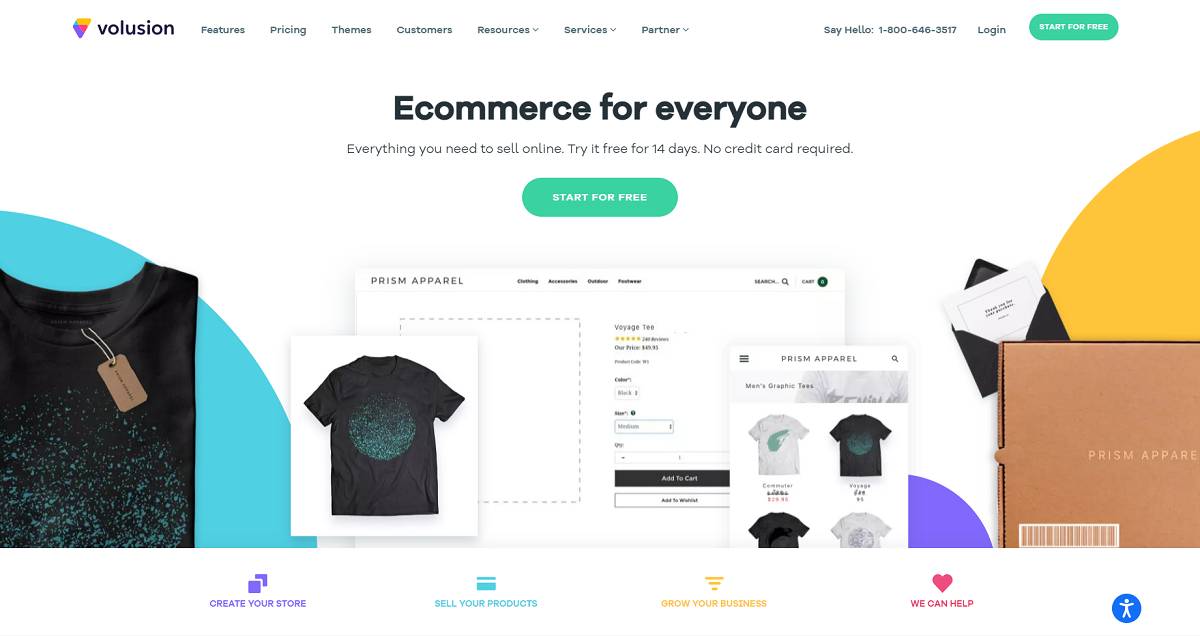
You may or may not have heard of this name, but the platform is very much popular amongst small & medium businesses.
It has been providing easy-to-use solutions to over 200k businesses since 1999.
Features:
Volusion sets out a wide range of legitimate features, including homepage slideshow, content editor shipping options, secure checkout, and more.
Moreover, as we mentioned above, Volusion has been serving for more than two decades.
So you can estimate how vast their experience is, this can easily be depicted on their features.
Pricing:
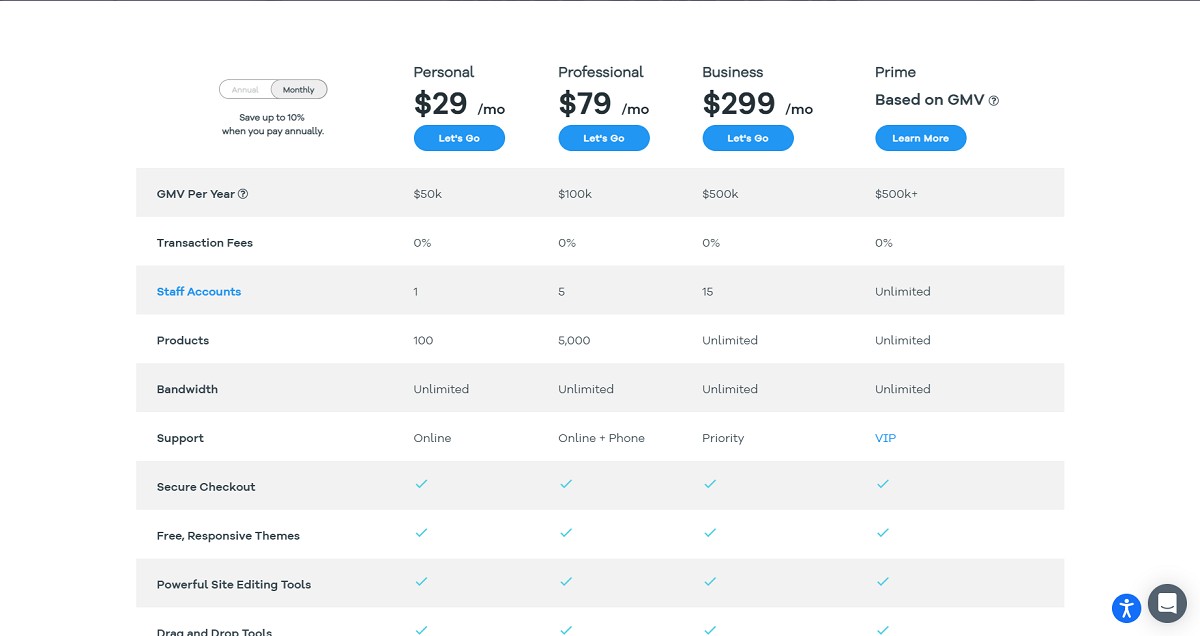
The pricing starts from $15 to $135 each month.
Its plans come with insane features such as the ability to create a “Add to Cart” connection, gift cards, and set categories and subcategories for items in your store.
Payment Gateways:
The platform has some renowned gateways such as Stripe, PayPal, and more.
It has its own gateway, too “Volusion Payments”.
Unlike Shopify, Volusion won’t charge you for any processing fees if you use a third-party provider.
So, this could also be a great Shopify alternative.
Pros:
- No Further Transaction Fees.
- Various Payment Processors.
- Quality themes.
- Simple Interface.
- In-house marketing team
Pros:
- You can only add 100 products to the basic plan.
- Bandwidth Limit each month.
- Coding is necessary.
- Integrations are very limited.
6. Magento

How could we forget this one of the amazing Shopify Alternatives?
Who doesn’t know about this platform?
It is a very popular open-source eCommerce solution that is extensively used by large brands all over the world.
Customization:
Through Magento, you can customize the way you want because the platform supports advanced customization.
As you will have access to the source code of Magento, so you or the developer will be able to modify and add to any part of the software as necessary.
Magento has the potential that will surely help your business stand out from your competitors.
Features:
This open-source platform comes with some immense built-in features.
What are those features?
It offers integrated checkout, payments, and shipping which includes international payment and shipping options.
Not only that but also, Magento enables site search, instant purchase, and the ability to integrate with any of the hundreds of plugins on its marketplace.
Pricing:
When it comes to pricing, Magento has both free and premium plans.
It has a community version which is totally free, however, its Enterprise Edition comes with $15,000-$50,000 a year.
In the free version, all you have to do is do it individually, while in the premium package, Magento developers will take care of it.
Pros:
- Magento has a vast network of more than 200k developers across the world, generating additional platform features.
- You have access to the backend to customize everything in your store due to its open-source nature.
- The platform offers an ample amount of SEO tools.
- Advanced customization & hundred of thousands of useful plugins.
- Responsive templates.
Cros:
- Magento has an incredibly comprehensive configuration, which results in high costs to complete the building.
- Although patches and updates are issued by Magento, you are responsible for downloading and managing these updates.
- Require hosting, coding, and IT security expertise.
7. Squarespace

Last but not least on the list is Squarespace, which is also one of the greatest Shopify Alternatives.
Squarespace is a prominent website builder offering full-fledged eCommerce support via its Squarespace eCommerce plans.
Themes Selection:
People know Squarespace for its fabulous template designs.
It has endless numbers of templates for online stores, restaurants, professional services, and more.
All the templates of Squarespace can be easily modified (even on mobile) with their in-built editor.
Features:
For both websites and online retailers, Squarespace provides substantial features.
The Squarespace website feature index is long, below we have included what they contain for their online shop:
- Email campaigns
- An integrated commenting system
- Unlimited products
- Abandoned checkout recovery
- Single-page and express checkout
- Third-party integrations, and more.
Pricing:
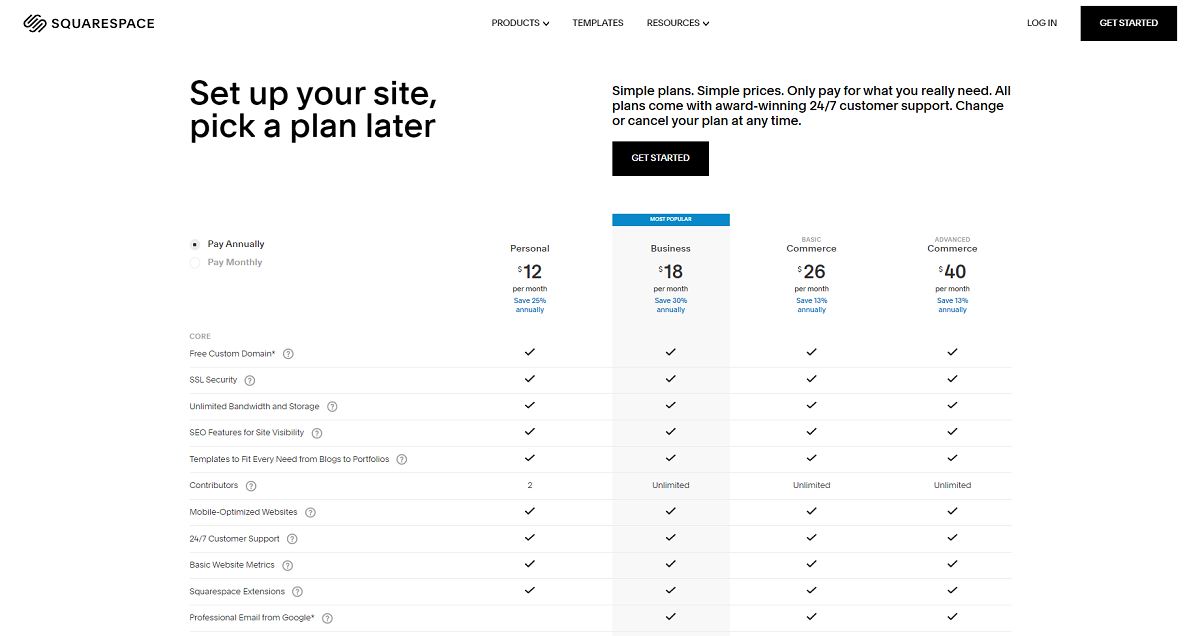
Its base plan of $26/month will provide you with unlimited galleries, blogs, bandwidth, storage, checkout, free domain, and SSL.
Moreover, its $40/month plan will get you some more such as:
- Real-time carrier shipping
- Automatic discounts
- Gift cards, and
- Abandoned cart auto-recovery.
Pros:
- Native integration with Squarespace email marketing.
- Intuitive interface.
- Awesome designs.
- No extra transaction fees.
Pros:
- Lacks of multi-channel functionalities
- Not as many add-ons as with Shopify
- Inadequate support
Final Thoughts On Shopify Alternatives
These are a total of seven Shopify alternatives that you only need to consider if you are starting your eCommerce store.
Yet, there are more than a hundred Shopify alternatives out there.
Why did we choose only seven?
Because alternatives are never too many.
So we picked some of the renowned websites like Shopify that most people prefer these days and make their store popular.
If we give our suggestions, then it would be WooCommmerce, BigCommerce, and Magento.
These three platforms will cover your store from all sides with their affordable prices, customization options, ample number of themes, and much more.
At the end of the day, you are the only one who decides which platform is perfect for your eCommerce store.
Never make a decision in a hurry. Consider all the aspects, take a free trial, and wisely choose your platform.
We hope you liked this article if you did then, let us know with which platform you are opening your store.
We’d love to hear your thoughts!
